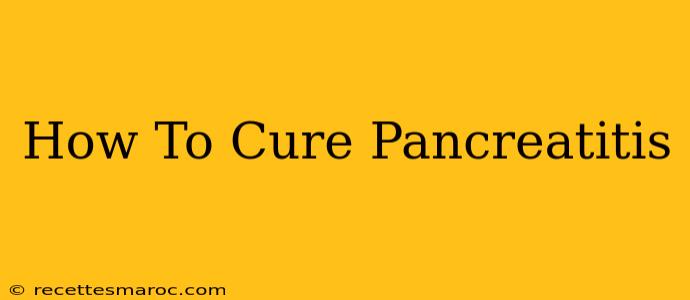Pancreatitis, the inflammation of the pancreas, can be a debilitating condition. While there's no single "cure" for pancreatitis, effective management strategies significantly improve symptoms and prevent complications. This comprehensive guide explores various approaches to managing and treating pancreatitis, focusing on lifestyle changes, medical interventions, and supportive care. Understanding your specific type of pancreatitis (acute or chronic) is crucial, as treatment varies. Always consult with your doctor for personalized advice.
Understanding Pancreatitis: Acute vs. Chronic
Before delving into treatment options, it's vital to differentiate between acute and chronic pancreatitis:
Acute Pancreatitis:
- Sudden onset: Characterized by a rapid and intense inflammation of the pancreas.
- Typically self-limiting: Most cases resolve with appropriate treatment within a few days or weeks.
- Causes: Gallstones, alcohol abuse, certain medications, infections, and high triglycerides are common culprits.
- Treatment focuses on: Supportive care, pain management, and addressing underlying causes.
Chronic Pancreatitis:
- Gradual onset: Persistent inflammation leading to irreversible damage to the pancreas.
- Progressive disease: Symptoms worsen over time, potentially leading to severe complications.
- Causes: Alcohol abuse is a primary cause; other factors include genetic predisposition, cystic fibrosis, and autoimmune diseases.
- Treatment focuses on: Pain management, nutritional support, and managing complications.
How to Manage and Treat Pancreatitis: A Multifaceted Approach
Treatment for pancreatitis is multifaceted and tailored to individual needs. The approach often involves:
1. Lifestyle Modifications: Crucial for Both Acute and Chronic Pancreatitis
- Dietary changes: A low-fat diet is often recommended to reduce pancreatic stimulation. Your doctor might suggest avoiding certain foods or following a specific diet plan. This is particularly important for chronic pancreatitis. Specific dietary recommendations should come from your doctor or a registered dietitian.
- Alcohol cessation: Essential for both acute and chronic pancreatitis, especially if alcohol is a contributing factor. Complete abstinence is vital for recovery and preventing relapse.
- Weight management: Maintaining a healthy weight can help reduce the burden on the pancreas.
- Smoking cessation: Smoking worsens pancreatic inflammation and can slow down healing.
2. Medical Interventions: Targeting the Root Cause and Symptoms
- Pain management: Effective pain relief is paramount, particularly in chronic pancreatitis. This might involve medications like analgesics or stronger opioid pain relievers in severe cases.
- Medication to reduce pancreatic enzyme production: Certain medications can help reduce the activity of the pancreas, lessening inflammation.
- Treating underlying conditions: Addressing conditions like gallstones (through surgery or other procedures) is crucial for preventing recurrent acute pancreatitis.
- Enzyme replacement therapy (ERT): For chronic pancreatitis, ERT helps supplement the pancreas's ability to produce digestive enzymes, improving digestion and nutrient absorption.
- Antibiotics: If an infection is present, antibiotics may be necessary to combat the infection.
3. Supportive Care: Addressing Complications and Improving Quality of Life
- Intravenous fluids: Often used in acute pancreatitis to hydrate the patient and support organ function.
- Nutritional support: Proper nutrition is crucial, especially if the pancreas is not functioning correctly. This might involve intravenous nutrition or a specialized diet.
- Surgery: In some cases, surgery might be necessary to remove gallstones, drain fluid collections, or address other complications like pseudocysts.
- Endoscopic procedures: Procedures such as endoscopic retrograde cholangiopancreatography (ERCP) can help diagnose and treat blocked pancreatic ducts.
Living with Pancreatitis: Long-Term Management
Chronic pancreatitis requires ongoing management to control symptoms and prevent complications. Regular follow-up appointments with your doctor are crucial. Your healthcare team will monitor your condition, adjust medication as needed, and provide guidance on maintaining your health.
Disclaimer: This information is intended for educational purposes only and should not be considered medical advice. Always consult with your doctor or other qualified healthcare professional for diagnosis and treatment of any medical condition.

